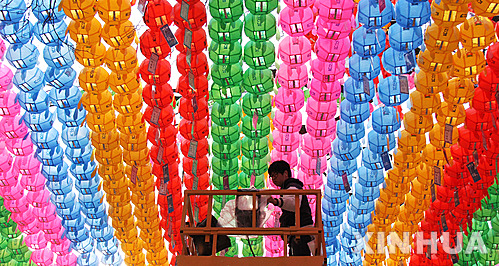Health and wealth Gospel of Korean Buddhism
Jason Lim – The Korea Times
Ven. Hyon Gak, who became a household name in Korea with the publication of his book, “Manhaeng: From Harvard to Hwagye Temple,” recently made front page news when he posted (in Korean) on his Facebook page his frustrations with the Jogye Order. He was empathizing with an article in Chosun Ilbo about prominent foreign professors leaving Seoul National University (the most prestigious university in Korea) due to challenges in working in the Korean academic cultural environment.
Hyon Gak wrote (my own translation), “I understand and agree with their (foreign professors who left) thinking. I, too, have no choice but to leave this narrow-minded confinement… foreign Buddhist monks have been nothing but decoration for the Jogye Order ― this has been my experience for the 25 years that I have been a monk.”
He expresses his inability to recommend life in the Jogye Order to his students in Europe due to the antiquated and non-inclusive nature of the organizational culture. He also writes of his sadness that the Korean Zen Buddhist teachings that his teacher, Ven. Sung San, had taught have not been supported by the Jogye Order, who seem to be taking Korean Buddhism back to the old Joseon style religion of “Health and Wealth Gospel”: in other words, a primitive form of transactional religious tradition in which worshippers pray to a deity for material favors. He concludes by stating, “‘Health and Wealth’ = $. Truly sad.”
Hyon Gak’s post triggered a furious public discussion over the current state of Korean Buddhism, including objections and counter accusations from some Korean Buddhist monks. In a radio interview, Ven. Ja Hyun from the Woljung Temple accused Hyon Gak of criticizing Korean culture from his perspective of white privilege.
Confused? Me too. So, let me lay out the salient points in Ja Hyun’s arguments and my accompanying thoughts.
One, “Health and Wealth” Buddhism is not so bad since every faith tradition starts out with people praying for favors from a deity. It serves a purpose.
It’s true that “Health and Wealth” type of faith traditions serve a purpose. By another name, it’s called paganism or superstition since you are offering a supernatural being your membership and loyalty in return for some material favors that you haven’t worked for or don’t deserve. Sure, it can offer temporary comfort and confidence to the believers but it certainly doesn’t lead to enlightenment as taught by the Buddha. In fact, it’s directly opposite of what Buddha taught about the nature of cause and effect.
Two, a majority of Buddhist monks make less than $1,000 per month. Even the wealthiest temples in Korea make far less than comparable churches. Buddhism is relatively clean in terms of its finances.
Declaring cleanliness by comparing yourself to Christianity in Korea is pretty sad. Also, Ja Hyun misses the point. Hyon Gak wasn’t criticizing how much money Buddhist temples make, per se, but how it perpetuates the “Health and Wealth” role of Buddhism in order to induce worshippers to donate more money. Korean Buddhism has commoditized the unspoken promise of supernatural favors based on the frequency and amount of your donations. True, this is no different from other religions, but it doesn’t make it right.
Three, the rigid hierarchy with military style expectations of obedience is part of the dominant Confucian culture of Korea. It’s not just a problem in the Jogye Order. Thereby, it’s not right for Hyon Gak, who has benefitted from Confucian culture’s emphasis on education (implying that Hyon Gak’s Yale and Harvard education gave him instant celebrity status in a Korea obsessed with the value of school’s name), to criticize the very culture that elevated him to his celebratory status. This is where Ja Hyun brought up the white privilege argument.
This response truly shows the emotional immaturity of Ja Hyun’s arguments. Even if we grant that Korea’s Ivy League obsession and Hyon Gak’s ethnicity were a factor in the latter’s popularity, it doesn’t mean that Hyon Gak can’t ever criticize elements of Korean culture.
But Ja Hyun’s underlying argument is one of “Us vs. Them.” He views Hyon Gak as the “Other” who has benefitted from Korean culture’s generosity but is now turning his back on Korea by daring to criticize it. All Ja Hyun has done is prove Hyon Gak’s very point that the Jogye Order considers foreign monks to be mere decorations, not full members with the right to voice thoughts and opinions and be involved in shaping the future direction of the organization.
Ironically enough, what Ven. Beop Ryun (probably the best known Buddhist monk in Korea) said previously helped me position this debate in its proper context. Beop Ryun said that we need to distinguish between Buddhism the culture vs. Dharma, which is Buddha’s original teaching.
To paraphrase, current Buddhism in Korea exists mostly as a cultural tradition, not as a vessel for the original teachings of the Buddha. As a cultural artifact, Buddhism serves a purpose similar to other popular faith traditions, but not necessarily as a vehicle for spiritual practice for those seeking enlightenment by following in the Buddha’s teachings. Hyon Gak was pointing out the latter, but Ja Hyun was defending the former.


























































